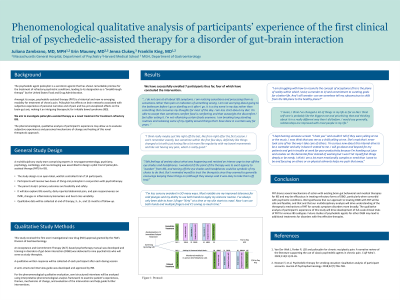Psychotherapy and Non-Pharmalogic Interventions
(156) Rationale and Methods for Phenomenological Qualitative Analysis of Participants’ Experience of the First Clinical Trial of Psychedelic-Assisted Therapy for a Disorder of Gut-Brain Interaction


Juliana zambrano, MD, MPH (she/her/hers)
Resident physician
Mass General Hospital
Boston, Massachusetts- EM
Erin Mauney, MD
Pediatric gastroenterology fellow
Massachusetts General Hospital
Boston, Massachusetts - FK
Franklin King, IV, M.D.
Psychiatrist
Massachusetts General Hospital
Boston, Massachusetts
Presenting Author(s)
Co-Author(s)
Background:
The psychedelic agent psilocybin is a serotonin agonist that has shown remarkable promise for the treatment of refractory psychiatric conditions, leading to its designation as a “breakthrough therapy” by the United States Food and Drug Administration. Amongst its scope, psychedelic-assisted therapy (PAT) is a historical and now re-emerging modality for treatment of chronic pain. Psilocybin has effects on brain networks associated with subjective experience of personal narrative and of pain and has yet unexplored effects on the brain-gut axis, making it an intriguing therapeutic for irritable bowel syndrome (IBS). We aim to investigate psilocybin-assisted therapy as a novel treatment for treatment-refractory IBS. The phenomenological, qualitative analysis of participant’s experience may allow us to evaluate subjective experiences and perceived mechanisms of change and healing of this novel therapeutic approach.
Methods:
A multidisciplinary study team comprising experts in neurogastroenterology, psychiatry, psychology, cardiology, and neuroimaging was assembled to design a pilot trial of psilocybin-assisted therapy (PAT) for IBS. The study design is an open-label, waitlist-controlled trial of 14 participants. Participants will receive two doses of 25mg oral psilocybin in conjunction with psychotherapy. The parent study’s primary outcomes are feasibility and safety. It will also explore IBS severity, daily reported abdominal pain, and pain responsiveness on fMRI, changes in inflammatory biomarkers and heart rate variability. Qualitative data will be collected at end of therapy, 3-, 6-, and 12-months of follow-up. For the phenomenological qualitative evaluation, semi structured interviews will be conducted, using thematic analysis to evaluate patient’s experiences, themes, mechanisms of change, and evaluation of the intervention to help guide further interventions.
Results:
This study received the first ever investigational new drug (IND) approval granted by the FDA’s Division of Gastroenterology. An Acceptance and Commitment Therapy (ACT)-based psychotherapy manual was developed and training in disorders of gut-brain interaction (DGBI) was delivered to nine psychiatrists who will serve as study therapists. A semi-structured interview guide was developed and approved by IRB. Enrollment will commence in April 2024, and we hope to have preliminary results by Nov/Dec 2024.
Conclusions:
PAT shares several mechanisms of action with existing brain-gut behavioral and medical therapies for IBS and may be efficacious in treating refractory forms of DBGI, particularly when comorbid with psychiatric conditions. We hypothesize that our approach to treating DGBI with PAT will be safe and feasible, and that and that our multidisciplinary analysis will drive understanding of the therapeutic mechanisms of PAT for somatic symptom disorders more broadly. The qualitative analysis of participant’s experience of this study will drive development of full-scale clinical trials of PAT for various IBS subtypes. Future studies of psychedelic agents for other DGBI may lead to additional treatments for disorders with few effective therapies.
1. Van Der Walt J, Parker R. LSD and psilocybin for chronic nociplastic pain: A narrative review of the literature supporting the use of classic psychedelic agents in chronic pain. S Afr Med J. 2023;113(11):22-26.
2. Noorani T, et al. Psychedelic therapy for smoking cessation: Qualitative analysis of participant accounts. Journal of Psychopharmacology. 2018;32(7):756-769.
Presentation Eligibility: Not previously published or presented
Diversity, Equity, and Inclusion: the lead author of this work is an immigrant of Latin American origin who is doing significant work to expand access to psychedelics for Hispanic/latinx individuals.

